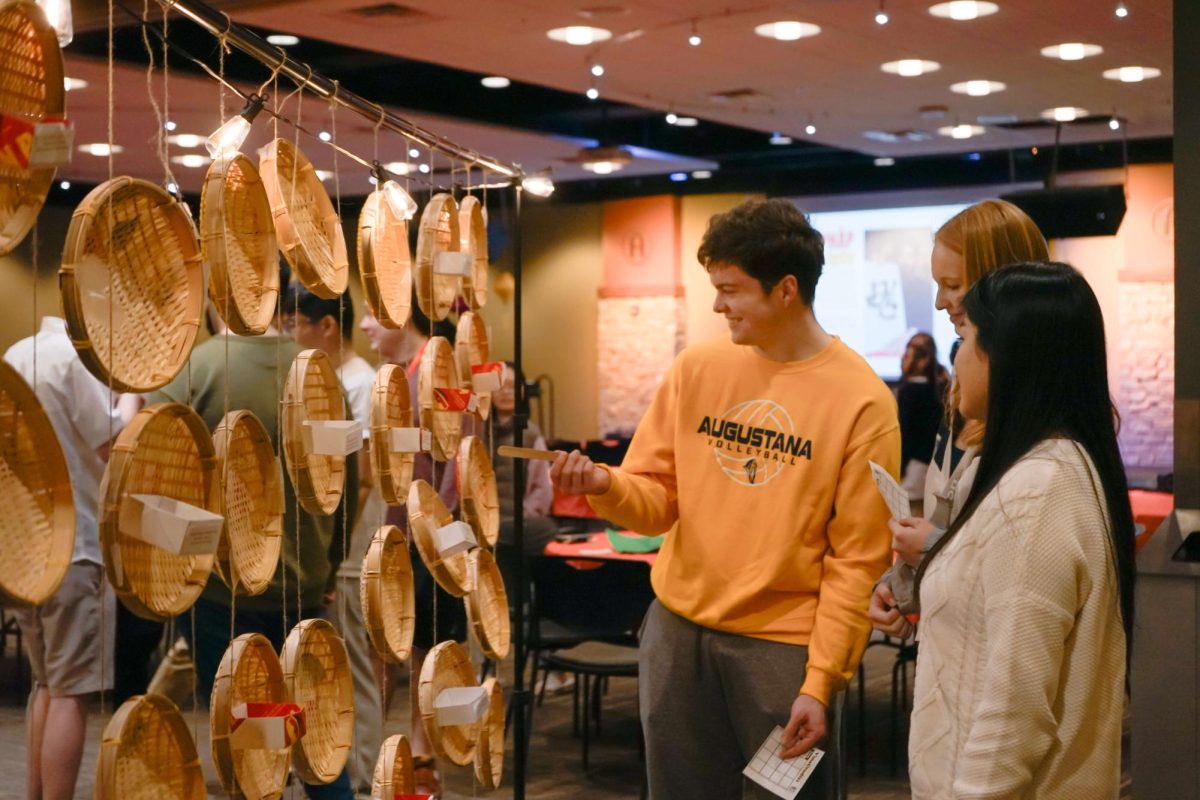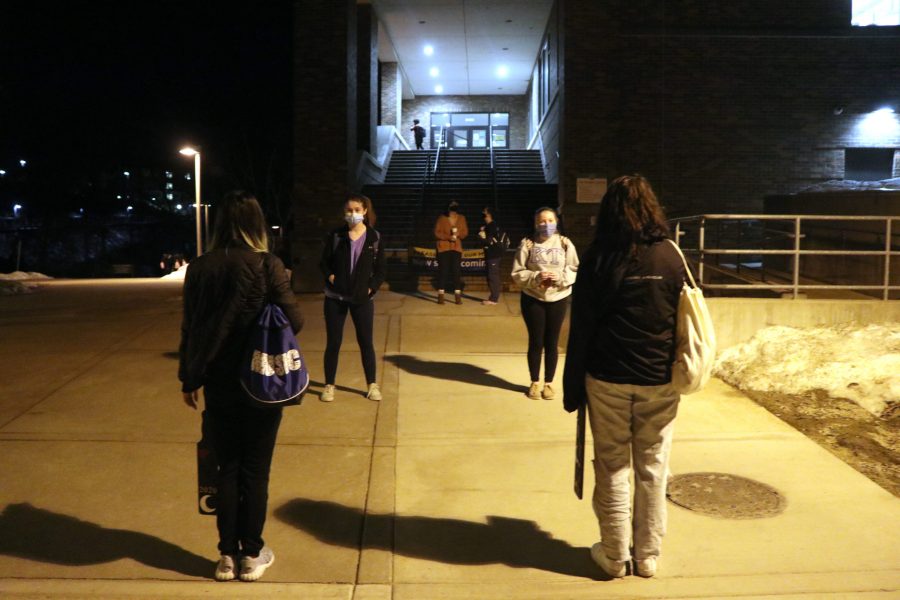From the outside looking in, Greek Life at Augustana is hard to pin down. Social groups, service fraternities and academic organizations vary enough that any generalized statement about Greek Life falls flat. For anyone who doesn’t participate, perceptions of Augustana’s groups are clouded by images of McMansions in nice neighborhoods, insane hazing practices, and Animal House-style hijinks.
Nationalized, state school groups paint a bougie picture of Greek Life. At schools with an established greek system, chapter membership in a sorority can cost up to $3,000 a semester. That cost is totaled from schools whose sorority houses are published in “Southern Living” magazine, but the problem shows up in any major university.
At the University of Central Florida, students in its Tri Delta chapter pay up to $2,346, a price tag made up of a one-time pledging fee, meals, socials fees and charges for parlor visits for students who don’t live in the central house. In addition to semester costs, the lifestyle of a chapter member runs more expensive than non-members.
Buying merchandise, trendy clothing and non-cafeteria food to enforce a uniform idea of wellness in a chapter ends up charging a high price.
When students come to Augustana and see a group of sorority members in matching swishies or a bunch of guys strolling around in suits on Thursdays, the question asks itself: “How much are these twenty-year-olds paying to essentially be in a club?”
Turns out, at Augustana the price tag on Greek Life is way less foreboding. Dues here average $200-$400 dollars a year, which can be paid any number of ways.
“I know everybody’s in a different situation financially, so we really like to do payment plans and then we do offer discounts at the beginning of the year if they pay in full,” Chi Alpha Pi (CAP) treasurer Justine Gorzny, senior, said. “So we have a lot of different options to make it more affordable for those members.”
Payment plans vary immensely among groups. While CAPs usually pay every semester or can create a personalized plan with their treasurer, other groups have different options.
“Say dues are 200 dollars, just figuratively, and they only have twenty dollars right now. We could set up a payment plan and then week by week keep accepting twenty more dollars until it’s all paid off.” Delta Omega Nu (DON) treasurer Ryley Knar, junior, said.
Alpha Sigma Xi (Alpha Sig) treasurer Frank Hoover, senior, has a six-week payment plan set up for group members. “If hypothetically, it’s 120 bucks, you can set that aside on a job and build up with that. They can be banking on that for the term prior or the summer.”
Dues are decided differently between each group. Most look to the previous year’s budget and make changes based on those numbers, but different groups like to cover different costs for members.
“A lot of the dues go into pledging,” Knar said. “Whatever events they’re doing, whatever the pledges need, if the actives need to buy things for the pledges to have.” While many groups ask that actives pay for gifts for their little, or that pledges purchase items for pledging on their own, Knar and previous DON treasurers prefer to cover it.
“It doesn’t come out of the pledge’s pocket, we compensate them after the process is done,” Knar said. For sororities, whose actives often spend more money on pledging than fraternities, items usually aren’t covered by the group’s budget.
CAPs can spend up to $100 dollars on their little during pledging, but the amount trends closer to $25 on average. “We give the bigs list way ahead of time, like at the beginning of the year, so they can [purchase] Black Friday deals, those end of the year deals, so it’s a lot more affordable,” Gorzny said.
Still, even that spending is considered a lower priority than supporting one’s little emotionally, rather than with purchased items. Gorzny doesn’t want bigs to feel that they have to spend more money to be a better member of the group. “It’s not about the gifts, it’s about the support you’re going to give them throughout the process.”
Pledges themselves pay a small fee at the beginning of rush, which is usually factored into their dues like a down payment. In a normal year, those dues would be spent on more than just informal and formal rush, especially since no event spaces are being rented out for students this year.
Before the pandemic interrupted college social lives, greek groups at Augustana would spend their dues on any number of things. Most groups put on a philanthropic event each year (Oktoberfest for Roundels, Mr. Augustana for CAP, etc.), and spend what’s left on social events, retreats, bonding activities and anything else a group may want.
A nationally-affiliated group like the Theatre Arts department’s Alpha Psi Omega National Theater Honor Society (Alpha Psi) may spend their budget on workshops, outreach at schools or the annual Vagina Monologues fundraiser for women’s charities.
Philanthropic events give Greek groups at Augustana the opportunity to invest their time and money into helping the community, a use of dues most groups agree is valuable spending.
“We’re still going to do Mr. Augustana, it’s obviously going to be a little bit virtual,” Gorzny said. “Mr. Augustana fundraises for the American Cancer Society, so this is a big fun event we like to do and it’s a really good way to give back.”
The pandemic has consistently lowered dues for groups, with some groups even helping members out with dues with the previous year’s unused budget. Costs for social events were cut, and the only new expense, for many groups, was a Zoom membership. In previous years, however, prospective members didn’t anticipate cheaper membership during a pandemic.
Sam Exner, sophomore, joined Zeta Phi Kappa (Zeta) last spring when the burgeoning pandemic led to pledging being cut short.
“On one of my very first nights of pledging, I asked my big how much it would cost and she gave me a very honest answer and told me that if money ever did become an issue, I could work out a payment plan,” Exner said.
Zeta ended up not charging dues last semester and reduced them this semester. The group has consistently put on virtual programming for members to still participate and bond with each other after losing time last year.
“This semester, dues were much cheaper and one hundred percent feel like they’ve been worth it so far,” Exner said. “Zeta does a wonderful job of making sure all of our members are involved. If there’s anything we do that requires us to pay, we are always told to talk to the treasurer and work with her to figure out a way for us to still be involved despite the cost.”
Money always gets complicated for college activities, as students pay to be at school in the first place. Augustana Greek Life groups could certainly overcharge members if they wanted to, with a precedent of $1000+ semester price tags at larger schools and the host of issues that comes with high-finance groups.
Despite that, Augustana groups work to make Greek Life affordable for prospective students with varied, manageable costs and nuanced payment options for students. “It’s definitely manageable to achieve that amount, and I would say it’s pretty worth it for some of the activities that you get to do,” Hoover said.
The question of worth is subjective, especially in extracurricular organizations. Greek Life at Augustana works to make it easier for students to call their involvement “worth it” despite the investment, paying high returns on dues in the form of opportunities and experiences.
Abbey Mondi • April 24, 2024

Jack Brandt • April 24, 2024
April 24, 2024
Maranda Bargren • April 24, 2024
Demystifying the money behind Greek Life
March 15, 2021
Leave a Comment
More to Discover

















































































































